The judge who allowed AT&T's mega-merger with Time Warner was clearly wrong in concluding the marriage won't harm consumers, the Trump Justice Department argued Monday in challenging the decision.
U.S. District Judge Richard Leon misunderstood the complexities of the booming pay-TV market and the nature of AT&T's competitors, the department's antitrust regulators asserted in their filing.
But AT&T General Counsel David McAtee said that there's nothing in the government's new filing that should lead to Leon's ruling being overturned. "Appeals aren't 'do-overs'," McAtee said in a statement.
Leon's June ruling opened the way for one of the biggest media deals ever: phone and pay-TV titan AT&T's $81 billion takeover of Time Warner, the owner of CNN, HBO, the Warner Bros. movie studio, "Game of Thrones," A-list sports programming and other "must-see" shows. He dismissed the government's argument that the combination would hurt competition, limit choices and jack up prices for consumers to stream TV and movies.
The merger was swiftly consummated, just two days after Leon's ruling and almost as soon as the Justice Department signaled it wouldn't seek to temporarily block the merger while it pondered an appeal.
If the government were to prevail in its appeal, the complex merger might have to be unwound.
Many legal experts believe the government will have a hard time convincing the appeals court to overturn Leon's ruling. Opposing the merger forced the federal antitrust regulators to argue against standing legal doctrine that favors mergers among companies that don't compete directly with each other.
That type of combination is called a vertical merger.
The U.S. antitrust lawsuit against Dallas-based AT&T was the first time in decades that the government has challenged that doctrine by suing to block a vertical merger.
The government contends that this vertical merger is different. By combining the coveted programming content of Time Warner's Turner Broadcasting with AT&T's vast distribution network for its DirecTV, the combination will hurt competition and violate federal law, it says. AT&T, the biggest pay-TV provider in the U.S., claims about 25 million of the 90 million or so households that are pay-TV customers.
Leon concluded otherwise "only by erroneously ignoring fundamental principles of economics and common sense," the government's filing said. "These errors distorted (Leon's) view of the evidence and rendered (his) factual findings clearly erroneous," it said.
Even with a small chance of the government winning, the stakes are high and the case could imprint the future course of antitrust regulation.
When the deal was first made public in October 2016, it drew fire from then-candidate Donald Trump, who promised to kill it "because it's too much concentration of power in the hands of too few." Trump has publicly feuded with Time Warner's CNN, calling it "failing" and a purveyor of "fake news." The president's statements didn't come up during the trial, though his antipathy loomed in the background.
Leon's ruling opened the floodgates to deal making in the fast-changing worlds of entertainment production and distribution.
Just a day after his decision, Comcast launched a $65 billion cash bid for the bulk of 21st Century Fox — topping Disney's all-stock $52.5 billion offer in December. Comcast dropped its bid last month in order to focus on its attempted buyout of European pay-TV operator Sky, and Disney — with its shareholders' blessing — now is closing in on a $71 billion acquisition of Fox's entertainment division.
Waiting in the wings are potential big-billions deals involving Verizon and CBS and T-Mobile and Sprint.
UNITED NATIONS (AP) — The United States vetoed a widely backed U.N. resolution Thursday that would have paved the way for full United Nations membership for Palestine, a goal the Palestinians have long sought and Israel has worked to prevent.
The vote in the 15-member Security Council was 12 in favor, the United States opposed and two abstentions, from the United Kingdom and Switzerland. U.S. allies France, Japan and South Korea supported the resolution.
The strong support the Palestinians received reflects not only the growing number of countries recognizing their statehood but almost certainly the global support for Palestinians facing a humanitarian crisis caused by the war in Gaza, now in its seventh month.
The resolution would have recommended that the 193-member U.N. General Assembly, where there are no vetoes, approve Palestine becoming the 194th member of the United Nations. Some 140 countries have already recognized Palestine, so its admission would have been approved, likely by a much higher number of countries.
U.S. deputy ambassador Robert Wood told the Security Council that the veto “does not reflect opposition to Palestinian statehood but instead is an acknowledgment that it will only come from direct negotiations between the parties."
The United States has “been very clear consistently that premature actions in New York — even with the best intentions — will not achieve statehood for the Palestinian people,” deputy State Department spokesman Vedant Patel said.
His voice breaking at times, Palestinian U.N. Ambassador Riyad Mansour told the council after the vote: “The fact that this resolution did not pass will not break our will and it will not defeat our determination.”
“We will not stop in our effort,” he said. “The state of Palestine is inevitable. It is real. Perhaps they see it as far away, but we see it as near.”
This is the second Palestinian attempt for full membership and comes as the war in Gaza has put the more than 75-year-old Israeli-Palestinian conflict at center stage.
Palestinian President Mahmoud Abbas first delivered the Palestinian Authority’s application for U.N. membership in 2011. It failed because the Palestinians didn’t get the required minimum support of nine of the Security Council’s 15 members.
They went to the General Assembly and succeeded by more than a two-thirds majority in having their status raised from a U.N. observer to a non-member observer state in 2012. That opened the door for the Palestinian territories to join U.N. and other international organizations, including the International Criminal Court.
Algerian U.N. Ambassador Amar Bendjama, the Arab representative on the council who introduced the resolution, called Palestine’s admission “a critical step toward rectifying a longstanding injustice" and said that “peace will come from Palestine’s inclusion, not from its exclusion.”
In explaining the U.S. veto, Wood said there are “unresolved questions” on whether Palestine meets the criteria to be considered a state. He pointed to Hamas still exerting power and influence in the Gaza Strip, which is a key part of the state envisioned by the Palestinians.
Wood stressed that the U.S. commitment to a two-state solution, where Israel and Palestine live side-by-side in peace, is the only path for security for both sides and for Israel to establish relations with all its Arab neighbors, including Saudi Arabia.
“The United States is committed to intensifying its engagement with the Palestinians and the rest of the region, not only to address the current crisis in Gaza, but to advance a political settlement that will create a path to Palestinian statehood and membership in the United Nations,” he said.
Mansour, the Palestinian U.N. ambassador, reiterated the commitment to a two-state solution but asserted that Israel believes Palestine "is a permanent strategic threat."
"Israel will do its best to block the sovereignty of a Palestinian state and to make sure that the Palestinian people are exiled away from their homeland or remain under its occupation forever,” he said.
He demanded of the council and diplomats crowded in the chamber: “What will the international community do? What will you do?”
Israeli-Palestinian negotiations have been stalled for years, and Israel’s right-wing government is dominated by hard-liners who oppose Palestinian statehood.
Israeli U.N. Ambassador Gilad Erdan called the resolution “disconnected to the reality on the ground” and warned that it “will cause only destruction for years to come and harm any chance for future dialogue.”
Six months after the Oct. 7 attack by the Hamas militant group, which controlled Gaza, and the killing of 1,200 people in “the most brutal massacre of Jews since the Holocaust,” he accused the Security Council of seeking “to reward the perpetrators of these atrocities with statehood.”
Israel’s military offensive in response has killed over 32,000 Palestinians, according to Gaza’s health ministry, and destroyed much of the territory, which speaker after speaker denounced Thursday.
After the vote, Erdan thanked the United States and particularly President Joe Biden “for standing up for truth and morality in the face of hypocrisy and politics.”
He called the Palestinian Authority — which controls the West Bank and the U.S. wants to see take over Gaza where Hamas still has sway — “a terror supporting entity.”
The Israeli U.N. ambassador referred to the requirements for U.N. membership – accepting the obligations in the U.N. Charter and being a “peace-loving” state.
“How can you say seriously that the Palestinians are peace loving? How?” Erdan asked. “The Palestinians are paying terrorists, paying them to slaughter us. None of their leaders condemns terrorism, nor the Oct. 7 massacre. They call Hamas their brothers.”
Despite the Palestinian failure to meet the criteria for U.N. membership, Erdan said most council members supported it.
“It’s very sad because your vote will only embolden Palestinian rejectionism every more and make peace almost impossible,” he said.
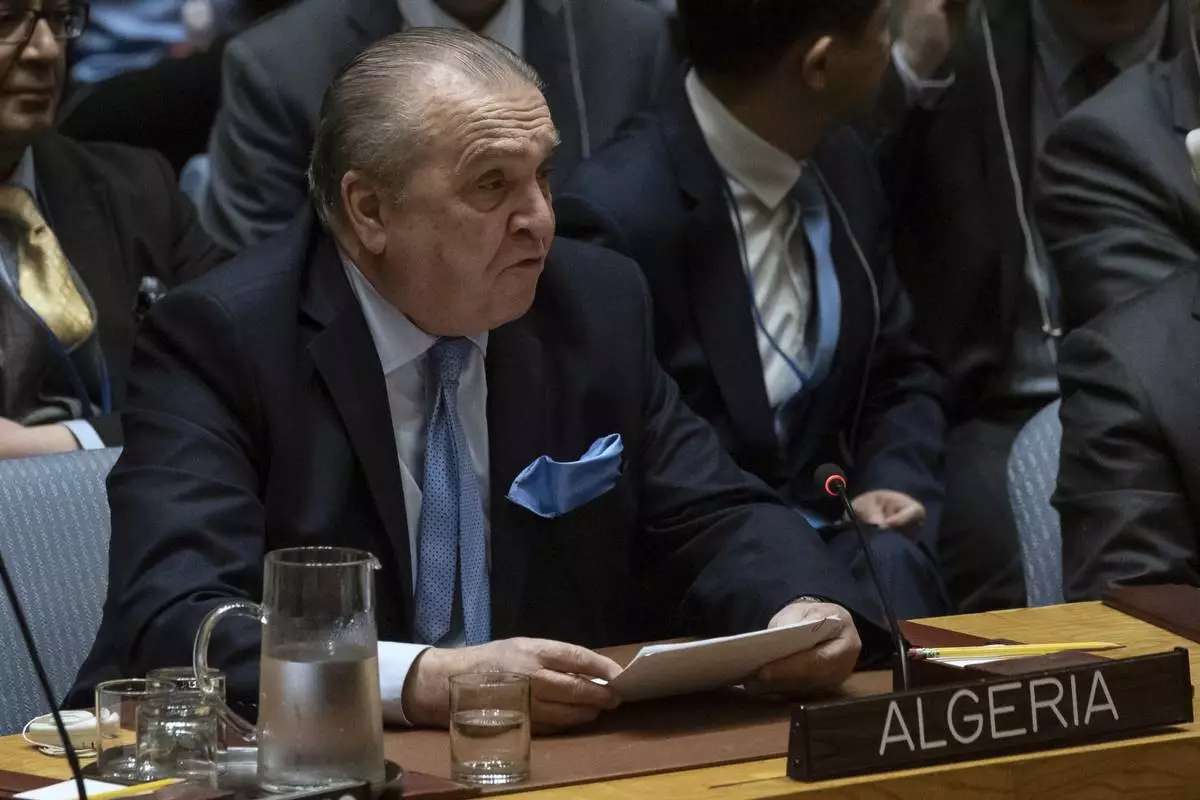
Algeria's Permanent Ambassador to the United Nations Amar Bendjama speaks during a Security Council meeting at United Nations headquarters, Thursday, April 18, 2024. (AP Photo/Yuki Iwamura)
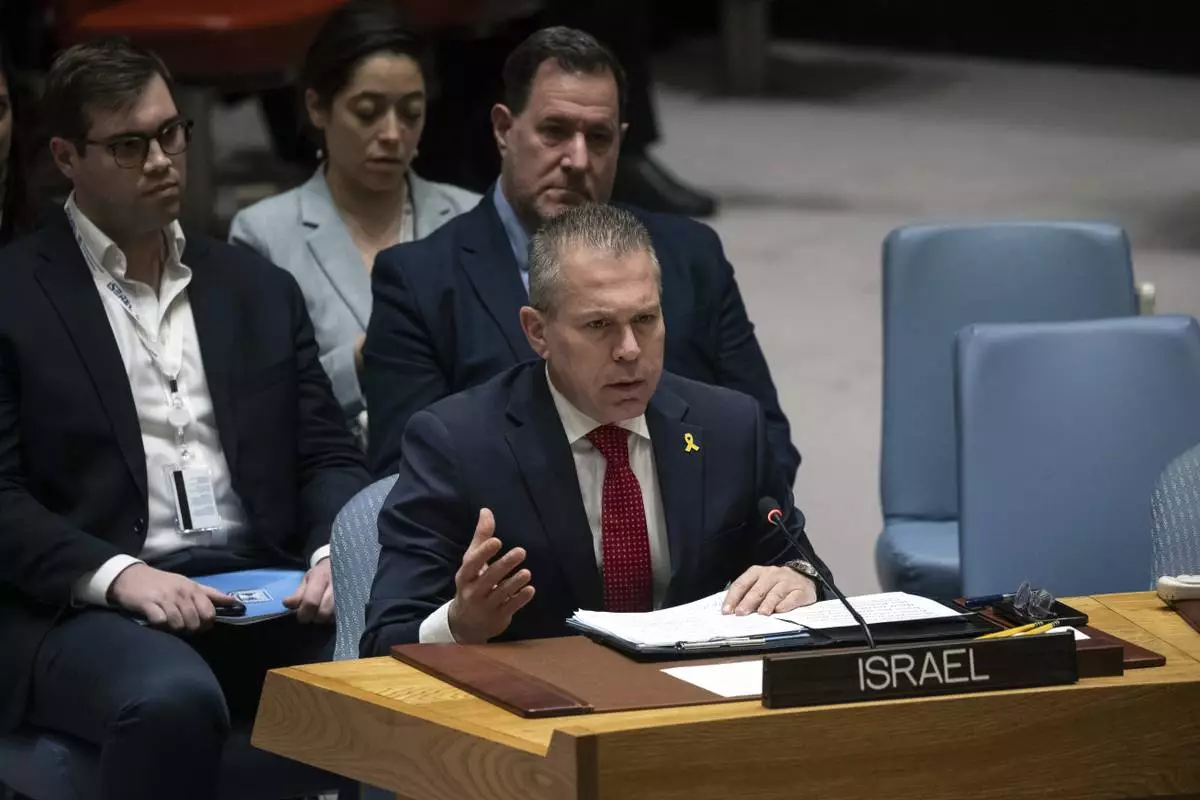
Israeli Ambassador to the United Nations Gilad Erdan speaks during a Security Council meeting at United Nations headquarters, Thursday, April 18, 2024. (AP Photo/Yuki Iwamura)
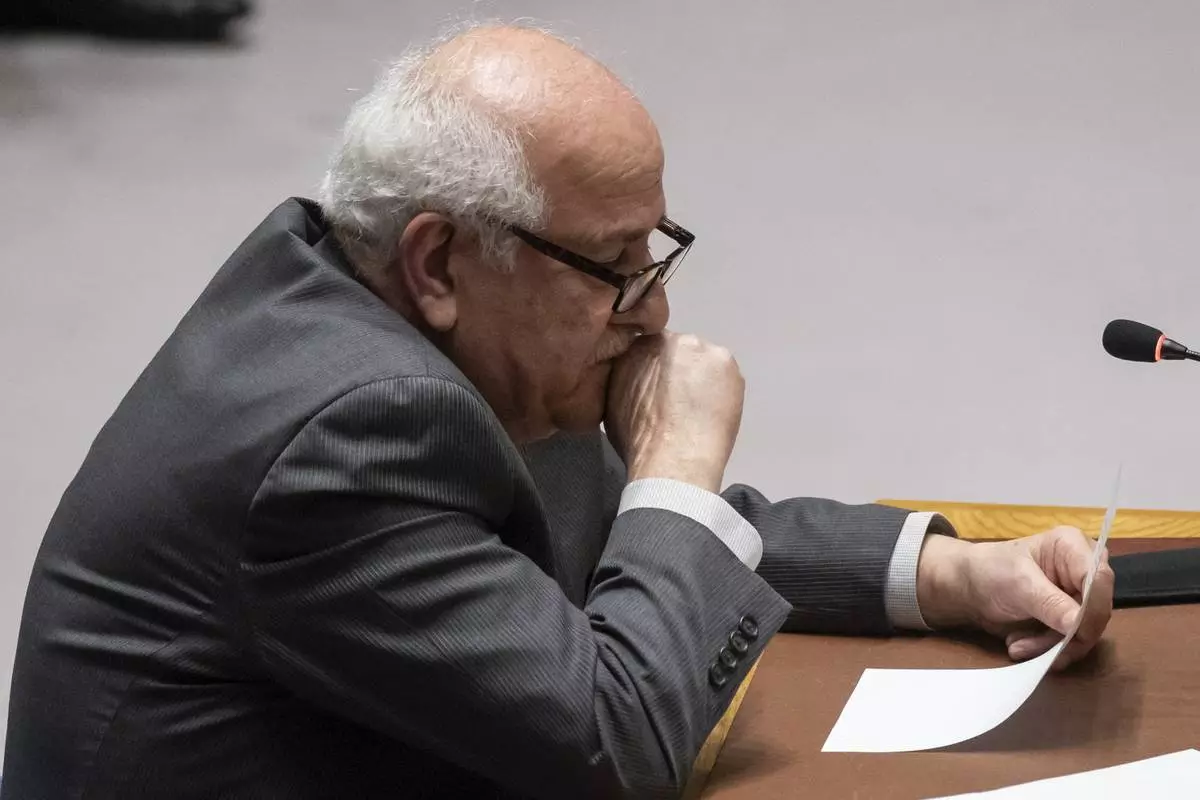
Palestinian Ambassador to the United Nations Riyad Mansour holds tears while speaking during a Security Council meeting at United Nations headquarters, Thursday, April 18, 2024. (AP Photo/Yuki Iwamura)
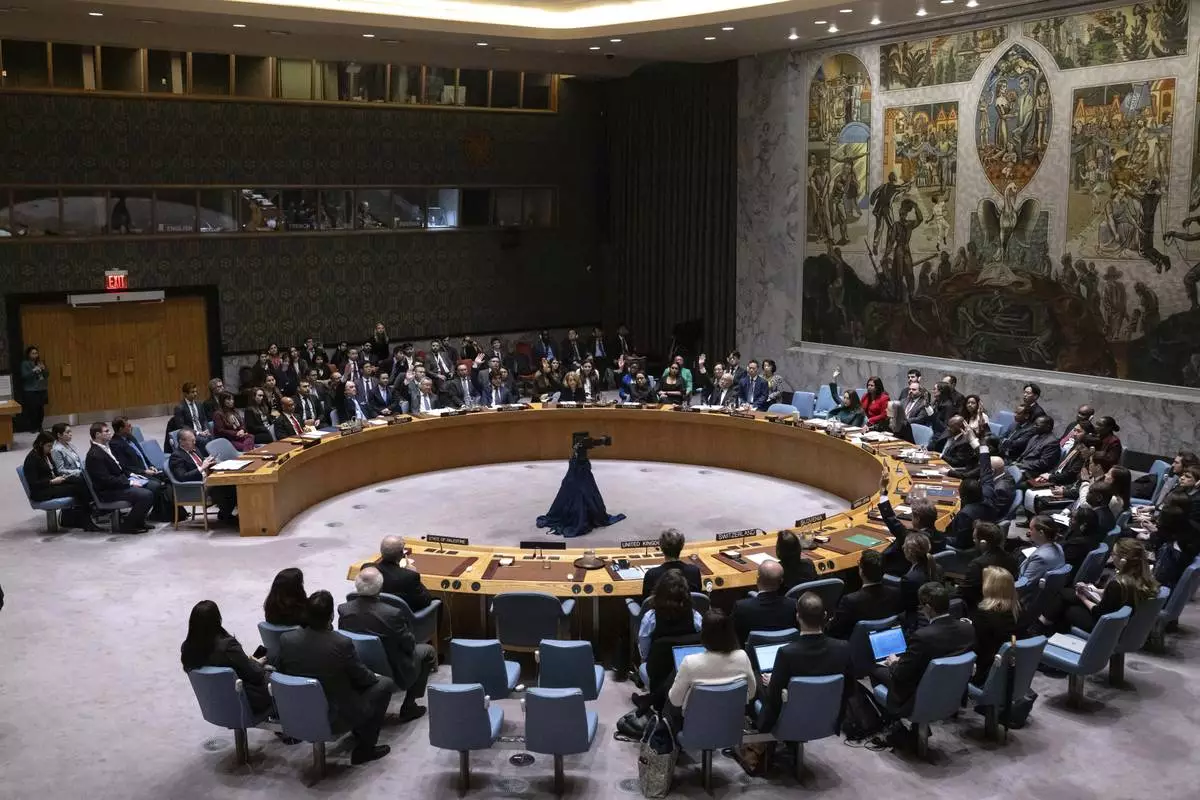
Representatives of member countries take votes during a Security Council meeting at United Nations headquarters, Thursday, April 18, 2024. (AP Photo/Yuki Iwamura)
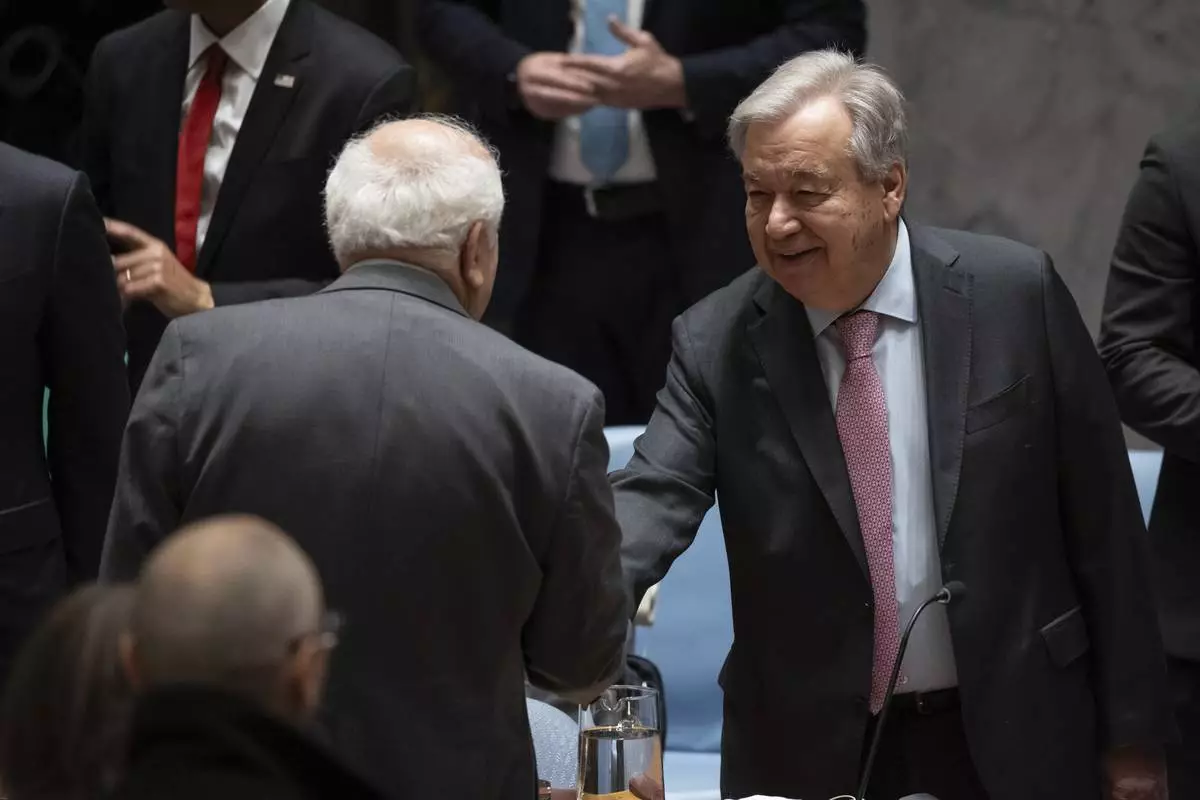
Palestinian Ambassador to the United Nations Riyad Mansour, left, and United Nations Secretary-General Antonio Guterres speak before a Security Council meeting at the United Nations headquarters, Thursday, April 18, 2024. (AP Photo/Yuki Iwamura)
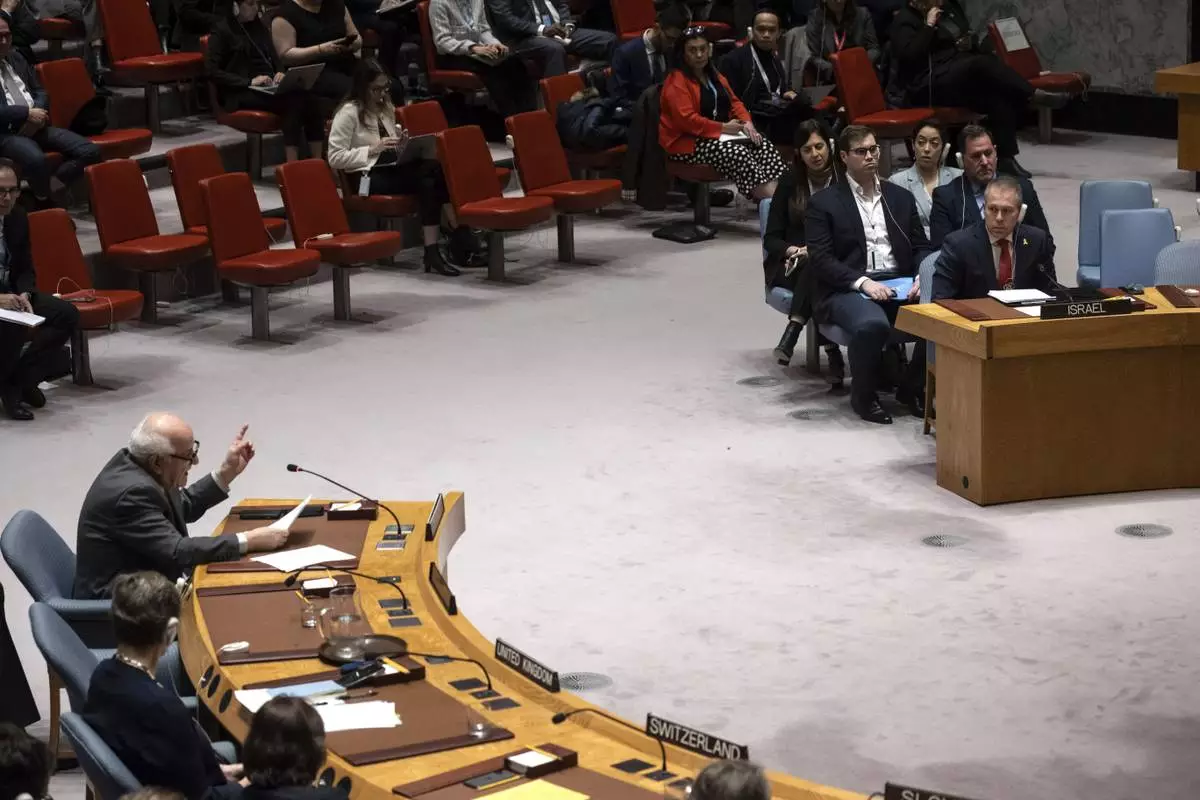
Palestinian Ambassador to the United Nations Riyad Mansour speaks during a Security Council meeting at United Nations headquarters, Thursday, April 18, 2024. (AP Photo/Yuki Iwamura)
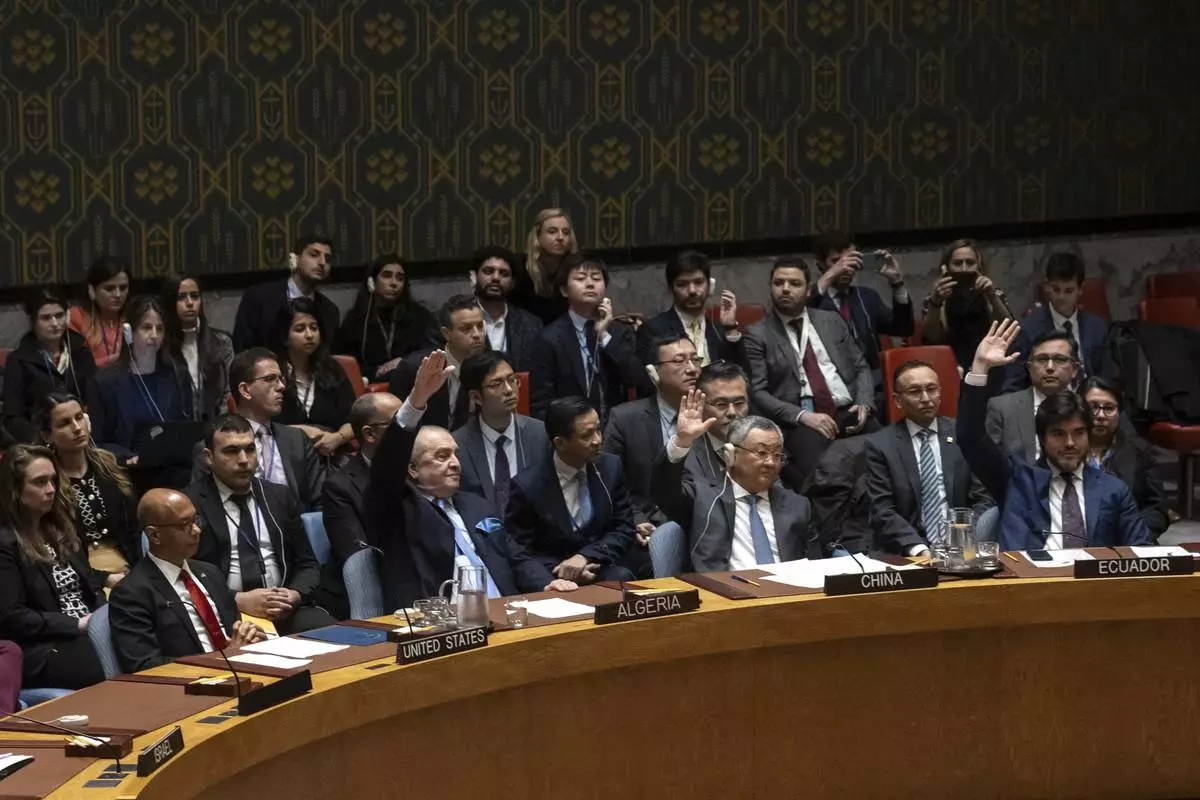
Representatives of member countries take votes during a Security Council meeting at United Nations headquarters, Thursday, April 18, 2024. (AP Photo/Yuki Iwamura)
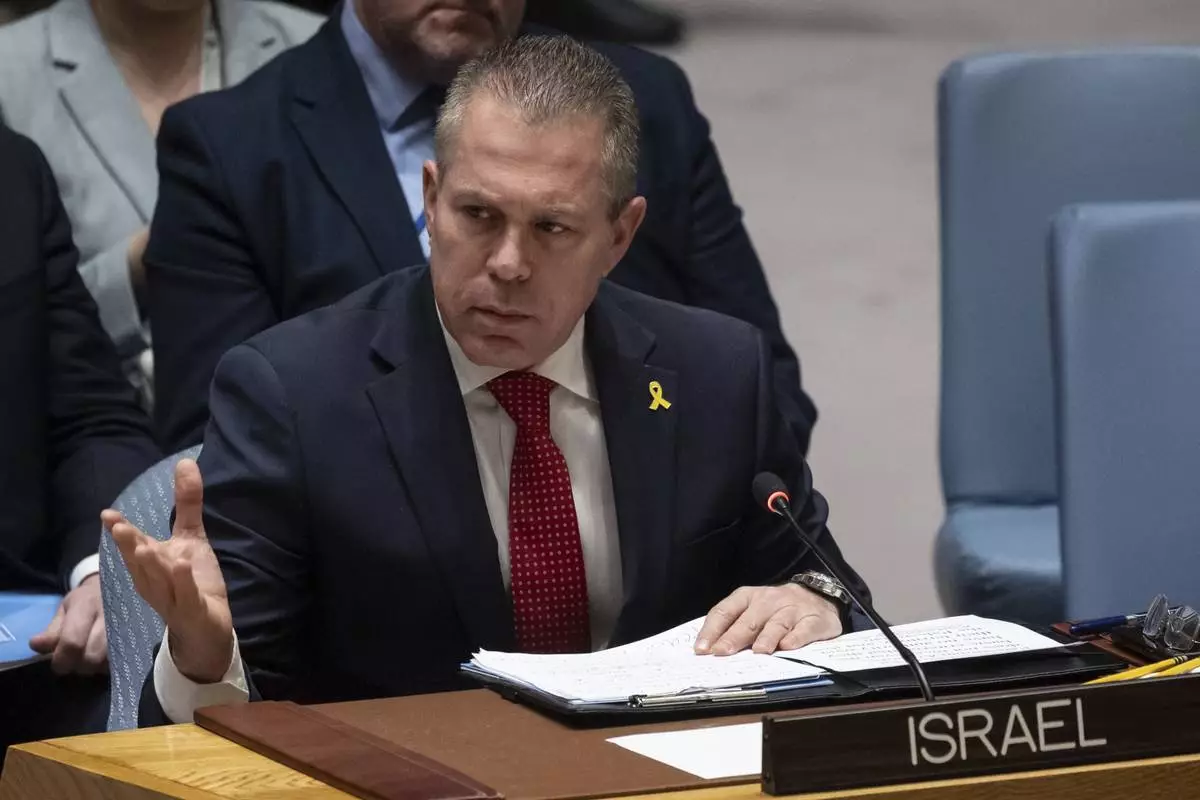
Israeli Ambassador to the United Nations Gilad Erdan speaks during a Security Council meeting at United Nations headquarters, Thursday, April 18, 2024. (AP Photo/Yuki Iwamura)
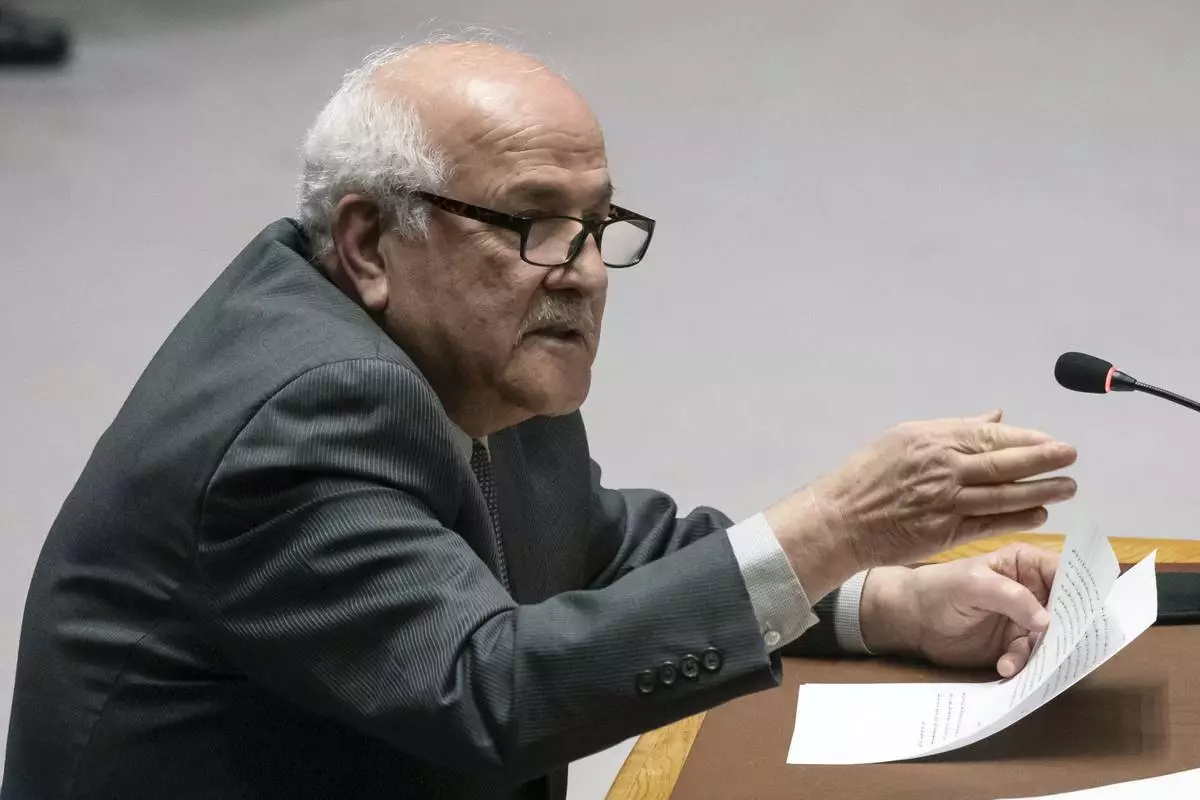
Palestinian Ambassador to the United Nations Riyad Mansour speaks during a Security Council meeting at United Nations headquarters, Thursday, April 18, 2024. (AP Photo/Yuki Iwamura)
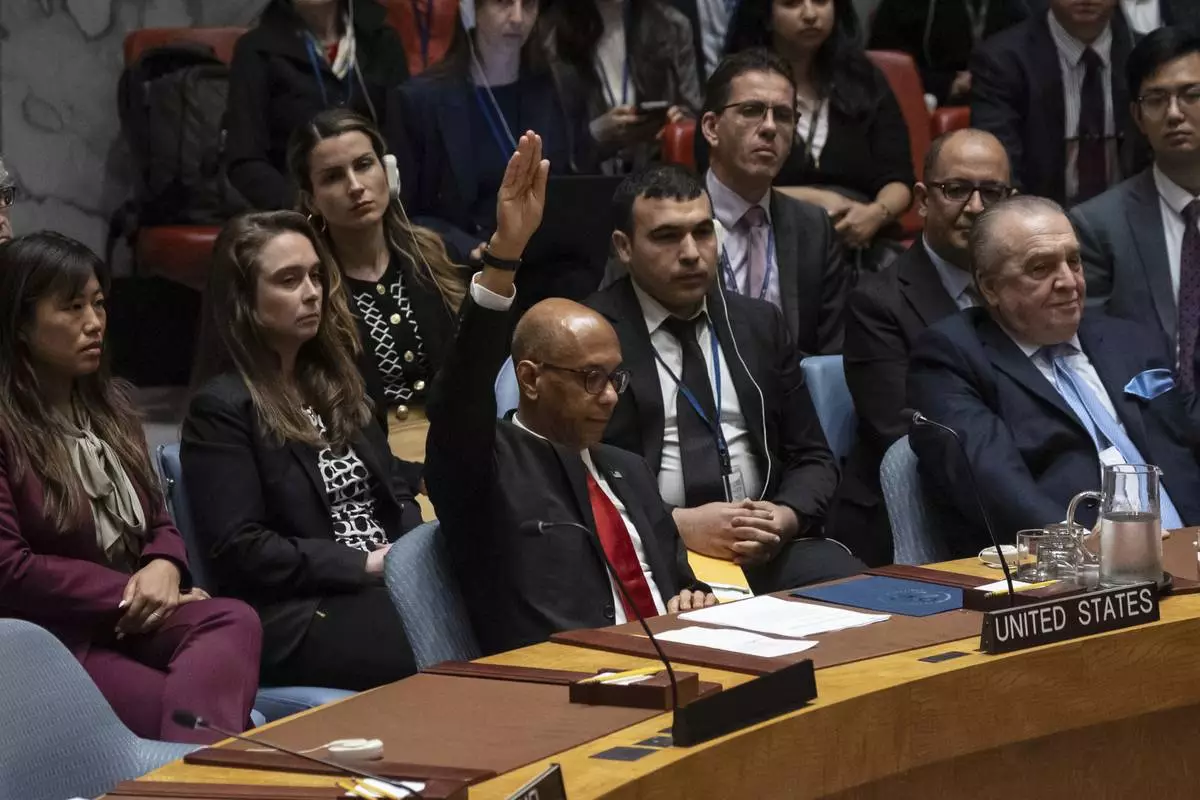
U.S. Deputy Ambassador Robert Wood votes against resolution during a Security Council meeting at United Nations headquarters, Thursday, April 18, 2024. (AP Photo/Yuki Iwamura)



















